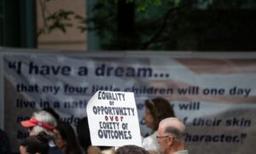Universities in Canada Grapple with an Emergence of Anti-Racist Racism
Canada’s progressive movement has embraced an extreme and regressive form of racial “justice”—an unhealthy fixation on race that has prompted controversial, race-based hiring on university campuses. While “anti-racist” activists have been gaining ideological ground in Canada for some time now, the summer 2020 killing of George Floyd in Minneapolis, Minnesota, was a turning point, reflecting a tremendous surge in their influence.
In the wake of American protests that crossed the northern border, Prime Minister Justin Trudeau dropped a stink bomb into Canadian political discourse, declaring Canada to be a systemically racist country.
The idea of systemic racism derives from critical race theory—a uniquely American ideology that argues America’s history of slavery, lynching, Jim Crow laws, “redlining,” and overall poor treatment towards black Americans is reflective of a country whose systems are fundamentally built to oppress blacks.
How this is supposed to apply to Canada is quite bewildering. Historically, sectarian and racial conflict in Canada was usually along Catholic-Protestant, French-English and English-Irish lines. And Canada has always been moralistically prideful about being a less racist country without the same disgusting history of black enslavement and wars against North America’s indigenous inhabitants.
Nonetheless, Floyd’s death was seen not only as a grave sin the United States had committed against black people, but one Canada was also guilty of. Canada’s anti-racist establishment on university campuses pounced on the opportunity Floyd’s death represented, drafting something called the “Scarborough National Charter”, which pressured Canadian academia to take significant action to address “systemic racism.”
The University of Calgary is one such institution committed to “anti-racism” as its guiding doctrine. After Floyd’s death, U of C President Ed McCauley issued a letter declaring systemic racism to be a “crisis that impoverishes society” and that “systemic racism requires a longitudinal journey of listening, learning, compassion, and commitment to change, followed by action.” McCauley promised that the U of C would take action.
One of the resulting measures is an “inclusive excellence cluster hiring initiative,” an overtly racist program that seeks to enshrine racially discriminatory hiring to “foster black inclusion in higher education.”
This policy is premised on the idea that inequities between two racial groups—whether that be in academic performance, income or otherwise—are reflective of one group discriminating against the other to provide themselves with an advantage. As Ibram X. Kendi has put it, “Racial inequity is evidence of racist policy.” Considerations of non-racial factors that may contribute to a disparity—a difference in median age, cultural attitudes, or social capital—are ignored or dismissed as “covert racism.”
In the U of C’s report on its cluster hiring initiative, the authors produced a series of pretty demographic data tables pointing to disparities between the institution’s academic staff and Canada’s overall racial made-up. Visible minorities make up almost 15 percent of the institution’s academics—about 7 percent short of the 22 percent they are of all Canadians. With these racial disparities revealed, campus anti-racist activists could pin the blame solely on racism, without even considering other possible causes.
The U of C ignored, for example, that many black Canadians and other visible minorities, especially those living in the Prairie provinces, are first-generation immigrants. There is a predictable lag between when new Canadians arrive and when they or their children would normally qualify for academia. The university also ignored the slow staff turnover rate typical of universities, which lengthens the time for demographic changes to be reflected in a given academic department.
The U of C seems oblivious to inconvenient details running counter to its systemic racism narrative, like the fact that 35 percent of its engineering professors are visible minorities. Is the U of C’s engineering faculty less racist than others, or are hordes of applicants somehow able to overcome life’s barriers and achieve the prerequisites to becoming a successful engineering professor?
Preferring one race over another is immoral and odious in whichever direction it may run, and will continue to breed injustice and resentment. There exists no egalitarian nirvana where racial disparities in education, income, and any other important measure have been eliminated. Racial discrimination cannot continue in perpetuity to cure the made-up societal ill that is systemic racism.
Rather than mire themselves in racial controversies, universities could simply implement fair, merit-based hiring which, with all their resources, they could easily adopt. If there are real racists on hiring committees holding minorities back, why not ferret them out?
A return to merit would first mean abandoning racial requirements
Source link






